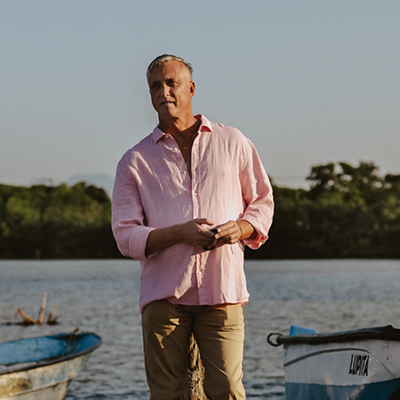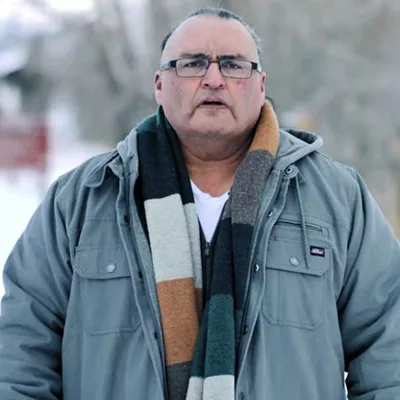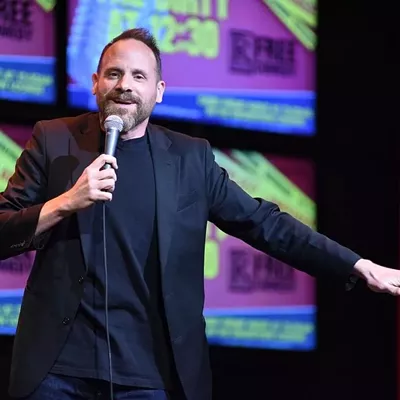In 1996, Phillips started a small discussion group "in a sliver of a coffee house in Montclair, New Jersey." Concerned that Americans were no longer talking to each other in helpful ways, Phillips wanted to get back to the roots of philosophy during Socrates time to "show you can vastly expand the range of questions you can interrogate." This gathering came to be known as the first Socrates Café. It has continued every Tuesday night since.
According to Phillips, there are approximately 300 ongoing dialogue groups throughout the United States and around the world, including Kabul, Afghanistan and Las Vegas. In Las Vegas, the group meets at the Mandalay Bay "amidst the clangor and quasi-challenging '70s music in a bookstore cafe." (For similar gatherings in Tucson, see our City Week listings.)
At a Socrates Café gathering, you "experience a motley group of people who have not had anything to do with each other having a vigorous, thoughtful, impassioned, respectful dialogue on a question they choose," says Phillips. "It's anti guru. They just throw out a question and then say, 'Let's vote.' We use three criteria. The question should leave you the most perplexed, the most curious and the least expert. You should want to inquire into a question you don't have the answer to."
Gatherings last between one to two hours and cover only one question. Typical questions might be "What is a good death?", "Who owns human life" or "How do you know when you know yourself?" Phillips says answers "give you a better sense of who you are and who you can be." But the key is not to come up with a final answer.
Nor is it to debate. "Instead of trying to win someone to your side, you share your view and support it with compelling reasoning," says Phillips. "You learn more about your own view by having it scrutinized by others.
"It's supposed to serve as a springboard for further inquiry," continues Phillips. "You don't bring it to closure. The idea is to have more questions at the end, and that can be great. It's an ever expanding, upward, evolving spiral that doesn't have an end. (When) people want to find a final answer, I think, heaven forbid, life would be boring."
Life got more exciting for Phillips in 1998 when he started a nonprofit to further his cause. The Society for Philosophical Inquiry (philosopher.org) supports philosophical inquirers in their quest to create a "more deliberative democracy." After applying to more than 200 organizations for philanthropic funding with no success, Phillips' wife suggested he write a book to reach a wider audience.
Phillips "brought philosophy to the people" by visiting prisons, nursing homes and homeless shelters along with the traditional coffee houses. He met people from all walks of life and discussed a variety of questions with them. His experiences in the United States are the basis for his first book, Socrates Café, published in 2001. Later that year, he published Philosopher's Club for children. Phillips is currently on a book tour for his third book, Six Questions of Socrates: A Modern-Day Journey of Discovery Through World Philosophy, published in 2004. He will appear at 7 p.m. Monday, May 9, at Barnes and Noble, 7325 La Cholla Blvd., to discuss his book and to hold a dialogue.
In Six Questions of Socrates, Phillips traveled around the world--including Mexico, Spain, Korea, Japan, Guatemala and the Navajo nation--to ask six questions: What is virtue, moderation, justice, good, courage and piety? "These questions are what most scholars agree are from Plato's earliest dialogues featuring Socrates. Socrates thought the answers to them would lead to truths on how to be an excellent human being," says Phillips.
What surprised Phillips on his journey was how different cultures had similar ideas. "Whether I went to Greece or Japan or the Navajo nation, they all agreed that a virtuous person acts a way in the world that makes society more harmonious. I was fascinated by that."
But in some locations, language did not translate easily. In Chiapas, Mexico, Phillips asked the question, "What is justice?" "They have no such word," he says. "I thought they were pulling my leg. They make all decisions (that are important to the community) as a community. They discuss it until there is universal consensus. They never had to evolve words such as justice or laws. I find that a marvelous way to exist."
While meeting people around the world, Phillips noticed another remarkable occurrence. "People (often) have invisible walls between themselves. They only gather with people who agree with them," he says. But by participating in Socrates Cafés, it's possible to change and "celebrate being with people with a plurality of perspectives. It's amazing to see different people treat each other with almost what I would call love, because they have broken away barriers of intolerance, suspicion and stereotyping. I feel much more hopeful and exhilarated by the sense of connection. It makes me realize we're all in this together."







